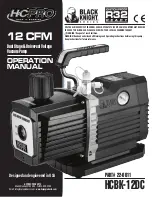
OPERATOR’S MANUAL
FC-P30A-UL
3.
TROUBLESHOOTING
OPERATOR’S MANUAL
FC-P30A-UL
6.
Poor flow
Filter is incorrect size for type of
fuel
Filter is clogged
Replace filter
Low air pressure
Check incoming supply air pressure. Check
regulator setting and adjust to 40 - 50 psi.
Check for tube connection and fittings.
Loose filter
Inspect and tighten
Replace with correct size filter 1 micron for
E85. 10 micron for gasoline, 30 micron for
diesel/kerosene
Pump is difficult to prime
Hose not submerged in fuel when
trying to prime
Check hose and reposition hose in vehicle
fuel tank
Fuel level gauge does not work
Float positioned diagonally across
tank
Remove red plastic nut and indicator cap.
Remove float mechanism and position so that
float is position across tank. Replace cap and
nut.
Ground wire is damaged or will not
clamp
Damaged
Replace
Leak in hose fittings
Check fittings and tighten
Damaged, kinked, or cracked hose
Replace with hose assembly
Leak at fittings or pump mount
Check fittings and tighten as required.
CONDITION
POSSIBLE CAUSE
SOLUTION
GENERAL PRODUCT DESCRIPTION
The Gas Caddy is designed and approved to safely transfer
fuel to and from a vehicle. It may be used to safely store fuel
during vehicle service. It is approved for use with unleaded
gasoline, diesel, and kerosene fuels.
The FC-P30A comes standard with a 10 micron filter for use
with gasoline. Other filters are available for other fuels. Select
the correct filter for the intended application. Proper filter
selection is critical to achieving maximum pumping efficiency
and to properly remove contaminates from the fuel.
Refer to the table shown in REPLACEMENT PARTS AND
ACCESSORIES if you intend to pump different fuels.
Fuel Type
Filter Type
Unleaded Gasoline
10 micron
Diesel and Kerosene
30 micron
ASSEMBLY
OPERATION
PUMPING FROM VEHICLE TO GAS CADDY
1. Wrap 2 inch NPT thread on fill tube 4-6 wraps with PTFE
tape wrapping clockwise.
2. Install quick-connect air fitting into air throttle valve.
3. Assemble the discharge hose threading the 3/4 NPT fitting
into 90° fitting located on the front of the valve assembly.
Tighten with wrench.
4. Coil and hang the discharge hose on the hose hanger
bracket on the side of the tank.
5. Thread the 2 inch fill pipe and cap assembly onto the fitting
in the center of the tank. Tighten by hand until secure.
6. Remove tape from top of fuel gauge and install plastic
indicator cap and plastic nut onto float assembly. Align
indicator mark to point diagonally across tank so that float is
free to move full range. Tighten nut by hand to secure cap
and fuel gage.
NOTE: The regulator is factory preset to 40 psi (2.75 BAR).
Adjust if desired to increase or decrease flow rate. Do not set
regulator above 50 psi (3.45 BAR). This will not increase flow
and result in premature wear of air motor and/or pump.
1. Position the Gas Caddy near the vehicle and lock the wheel
brakes.
2. Attach the ground wire clamp to the vehicle to a known
ground surface.
3. Place the hose inside the fill pipe of the vehicle fuel tank.
4. Align valve handle so that the point is to the “IN” to tank
postilion. See Figure 2.
5. Connect shop air supply.
WARNING: AIR SUPPLY MUST
NOT EXCEED 120 PSI.
6. Squeeze the air throttle valve to operate pump. Closely
monitor flow to prevent overfilling.
7. Release valve when desired amount is pumped.
8. Uncoil and raise the hose and breifly run the pump to return
any remaining fuel in the system to the tank.
9. Coil and hang the hose on the hanger bracket.
10. Turn valve handle to the “OFF” position.
Tools and Supplies (not included):
• TPFE tape
• 1-1/16 inch open end wrench
• 1/4” NTP Quick-connect fitting to connect to shop air.
Fig. 1
Fig. 2


























